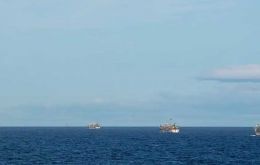MercoPress. South Atlantic News Agency
Chile
-
Saturday, October 25th 2025 - 10:00 UTC
Punta Arenas planning a world-class aquarium with over 90 Antarctic species

Punta Arenas, extreme south of Chile, is planning and betting big, a future polar aquarium at the International Antarctic Center, CAI, exhibiting over 90 species from the austral ocean, and with four main sponsors, the Magallanes University, the Magallanes Region Government, the Chilean Antarctic Institute and the Chilean Science Ministry
-
Friday, October 24th 2025 - 10:10 UTC
Chinese fishing near Chilean waters on the rise?

The Chilean Navy has detected a significant surge in activity by Chinese-flagged fishing vessels operating near the country's Exclusive Economic Zone (EEZ), prompting concerns about potential illegal, unreported, and unregulated (IUU) fishing.
-
Thursday, October 23rd 2025 - 10:26 UTC
Press freedom under scrutiny in Chile

Recent international reports have painted a stark picture of press freedom in Chile, citing a marked by violence, judicial harassment, and legislative threats to investigative journalism.
-
Saturday, October 18th 2025 - 09:50 UTC
Missing FACh helicopter found - one crewmember dies

Chile's Air Force (FACh) confirmed on Friday that it had located the MH-60M Black Hawk helicopter that had gone missing the previous afternoon in the Southern Ice Fields sector of the Aysén region, with four crew members on board.
-
Friday, October 17th 2025 - 10:19 UTC
FACh helicopter goes missing

Chile's Air Force (FACh) lost contact on Thursday afternoon with an MH-60M Black Hawk helicopter carrying four crew members near the Eduardo García Soto refuge in a remote area of the Southern Ice Fields in the Aysén region.
-
Friday, October 17th 2025 - 01:34 UTC
Argentina's pension system among the worst

According to the 2025 Mercer CFA Institute Global Pension Index, Argentina's pension system ranked 51st out of 52 countries surveyed, while those of Chile and Uruguay stood out in the region. The Netherlands topped the list globally with a score of 85.4 (A rating).
-
Tuesday, October 14th 2025 - 10:40 UTC
Boric welcomed at Holy See by Leo XIV

Pope Leo XIV welcomed Chilean President Gabriel Boric Font at the Vatican Apostolic Palace on Monday. Following the private meeting, the South American leader met with Cardinal Secretary of State Pietro Parolin and Archbishop Paul Richard Gallagher, Secretary for Relations with States.
-
Monday, October 13th 2025 - 10:29 UTC
Chile's CPI grows 0.4% in September

The Consumer Price Index (CPI) in Chile rose 0.4% in September, matching analyst expectations. This monthly increase caused the 12-month inflation rate to accelerate to 4.4%.
-
Thursday, October 9th 2025 - 19:51 UTC
Chile: Boric launches new phase of border patrolling program

Chilean President Gabriel Boric announced a major constitutional reform to strengthen border security and combat irregular migration. He made those remarks on Tuesday during a visit to the border town of Colchane in the Tarapacá region, where he also presented the progress of the Integrated Border System (Sifrón).
-
Thursday, October 9th 2025 - 10:30 UTC
Uruguayan President Orsi holds talks with Michelle Bachelet

Former two-time Chilean President Michelle Bachelet met on Wednesday in Montevideo with Uruguayan President Yamandú Orsi as part of her campaign to bid for the position of United Nations (UN) Secretary-General, replacing the Portuguese António Guterres.
